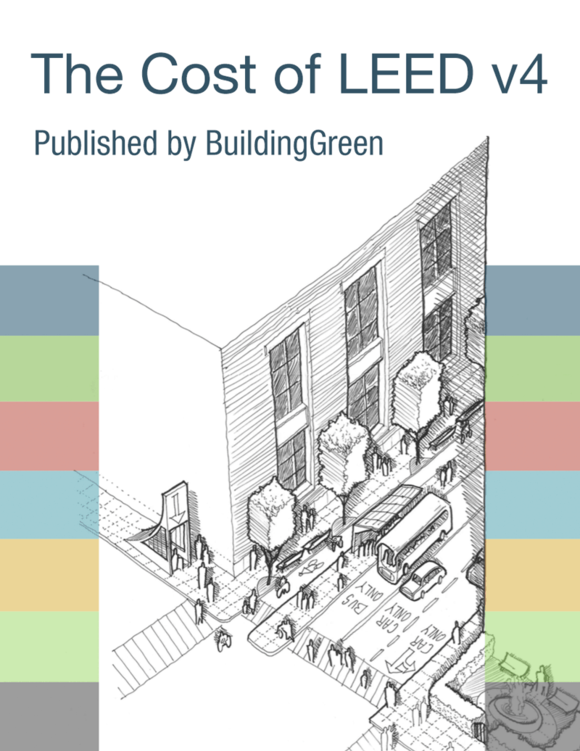LEEDuser overview
Explore this LEED credit
Post your questions on this credit in the forum, and click on the credit language tab to review to the LEED requirements.
Credit language
Requirements
Nonresidential buildings, mixed-use buildings, and multifamily residential buildings four stories or more
For new buildings and buildings undergoing major renovations as part of the project, reduce indoor water usage by an average of 20% from a baseline. All newly installed toilets, urinals, private lavatory faucets, and showerheads that are eligible for labeling must be WaterSense labeled (or a local equivalent for projects outside the U.S.).
For the fixtures and fittings listed in Table 1, as applicable to the project scope, reduce water consumption by 20% from the baseline. Base calculations on the volumes and flow rates shown in Table 1.
The design case is calculated as a weighted average of water usage for the buildings constructed as part of the project based on their floor area.
Table 1. Baseline water consumption of fixtures and fittings
| Commercial Fixtures, Fittings, and Appliances |
Current Baseline (IP Units) |
Current Baseline (SI units) |
| Water closets (toilets)* |
1.6 gallons per flush (gpf) |
6 liters per flush (lpf) |
| Urinal* |
1.0 (gpf) |
3.8 lpf |
| Public lavatory (restroom) faucet |
0.5 gpm at 60 psi all others except private applications |
1.9 lpm at 415 kPa, all others except private applications |
| Private lavatory faucet* |
2.2 gpm at 60 psi |
8.3 lpm at 415 kPa |
| Kitchen faucet (excluding faucets used exclusively for filling operations) |
2.2 gpm at 60 psi |
8.3 lpm at 415 kPa |
| Showerhead* |
2.5 gpm at 80 psi per shower stall |
9.5 lpm at 550 kPa per shower stall |
| * WaterSense label available for this product type
gpf = gallons per flush
gpm = gallons per minute
psi = pounds per square inch
lpf = liters per flush
lpm = liters per minute
kPa = kilopascals |
New single-family residential buildings and new multiunit residential buildings three stories or fewer
90% of residential buildings must use a combination of fixtures and fittings that would earn 2 points under LEED v4 Building Design and Construction: Homes and Multifamily Lowrise WE Credit Indoor Water Use.
See all forum discussions about this credit »
What does it cost?
Cost estimates for this credit
On each BD+C v4 credit, LEEDuser offers the wisdom of a team of architects, engineers, cost estimators, and LEED experts with hundreds of LEED projects between then. They analyzed the sustainable design strategies associated with each LEED credit, but also to assign actual costs to those strategies.
Our tab contains overall cost guidance, notes on what “soft costs” to expect, and a strategy-by-strategy breakdown of what to consider and what it might cost, in percentage premiums, actual costs, or both.
This information is also available in a full PDF download in The Cost of LEED v4 report.
Learn more about The Cost of LEED v4 »
For full access, sign up now for LEEDuser Premium
Already a premium member?
Log in now
Checklists
Step by step to LEED certification
LEEDuser’s checklists walk you through the key action steps you need to earn a credit, including how to avoid common pitfalls and save money.
For full access, sign up now for LEEDuser Premium
Already a premium member?
Log in now
Documentation toolkit
The motherlode of cheat sheets
LEEDuser’s Documentation Toolkit is loaded with calculators to help assess credit compliance, tracking spreadsheets for materials, sample templates to help guide your narratives and LEED Online submissions, and examples of actual submissions from certified LEED projects for you to check your work against. To get your plaque, start with the right toolkit.
For full access, sign up now for LEEDuser Premium
Already a premium member?
Log in now
Addenda
01/10/2014– Updated: 14/02/2015
Form Update
Description of change:
5000016
Fixed errors in previous version including uses per day calculation. Added override functions for special circumstances, modified built-in dual flush calculator, added custom naming of tabs and streamlined output fields
Added Neighborhood Development calculations
Internationally Applicable:
Yes
LEED Interpretation
Inquiry:
Can automated-maintenance urinals be considered "waterless" for the purposes of WE prerequisite and credit Indoor Water Use Reduction?
Ruling:
Yes, automated maintenance urinals with water use not to exceed 150 gallons (568 liters) annually can be considered as waterless urinals for the purposes of credit achievement calculations in LEED v4 WE prerequisite and credit Indoor Water Use Reduction. Do not include the volume of water used by these urinals in the LEED v4 Indoor Water Use Calculator (they can be excluded, or considered to have a water use of 0 gallons/liters). Projects must also submit manufacturer documentation showing the annual volume of water used by the urinals.
Internationally Applicable:
Yes
See all forum discussions about this credit »


